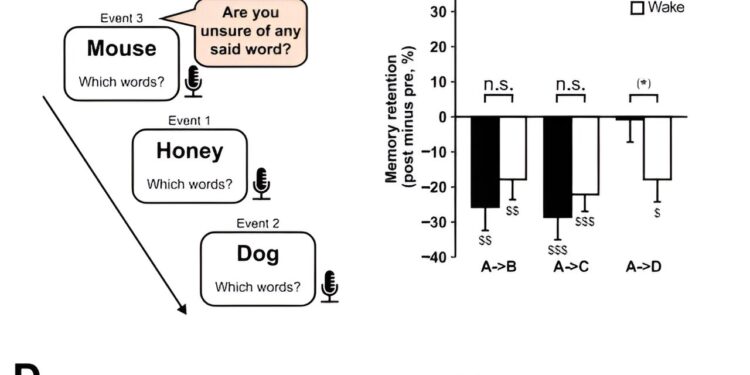Task and results of non-category-specific recall. Credit: Proceedings of the National Academy of Sciences (2024). DOI: 10.1073/pnas.2314423121
Researchers have long known that sleep consolidates our memories of episodic facts and events. However, until now, research has focused mainly on simple associations, that is, connections between elements, such as those one makes when learning new vocabulary.
“But in real life, events usually consist of many elements, for example a place, people and objects, which are linked together in the brain,” explains Dr. Nicolas Lutz from the Institute of Medical Psychology of the LMU.
These associations may vary in strength and some elements may be related to each other only indirectly. “Thanks to the neural connections that underlie these associations, a single cue word is often enough for someone to remember not only individual aspects of an event, but also multiple aspects at once,” says Lutz.
This process, known as pattern completion, is a fundamental feature of episodic memory. Lutz is the lead author of a study recently published in the Proceedings of the National Academy of Scienceswho studied the effect of sleep on the memory of such complex events.
After study participants learned events with complex associations, in one condition they spent the night in a sleep laboratory, where they were allowed to sleep as usual, while in another condition, they had to stay awake all night. In both conditions, participants were allowed to spend the following night at home to recover. Next, they were tested on their ability to remember different associations between elements of the learned events.
“We were able to demonstrate that sleep specifically consolidates weak associations and strengthens new associations between elements that were not directly connected to each other during learning. In addition, the ability to memorize several elements of an event together , after being confronted with a single signal, improved after sleep compared to the state in which the participants had remained awake”, summarizes Nicolas Lutz. This demonstrates the importance of sleep for completing partial information and processing complex events in the brain.
By monitoring the brain activity of study participants during sleep, the study authors were also able to show that improved memory performance is linked to so-called sleep spindles, i.e. ‘that is, bursts of neuronal oscillatory activity during sleep, which are associated with the active consolidation of memory contents. This occurs through the reactivation of underlying neural structures during sleep.
“This finding suggests that sleep spindles play an important role in the consolidation of complex associations, which are the basis for completing memories of entire events,” explains Professor Luciana Besedovsky, lead researcher of the study.
According to Lutz and Besedovsky, the identified effects of sleep on memory can be seen as an important adaptation of the human brain, because it helps people form a more coherent picture of their environment, which allows them to make more complete predictions about the future. events.
“Our results thus reveal a new function by which sleep may provide an evolutionary advantage,” says Besedovsky. “In addition, they open new perspectives on how we store and access information about complex multi-element events.”
More information:
Nicolas D. Lutz et al, Sleep shapes the associative structure underlying pattern completion in multielement event memory, Proceedings of the National Academy of Sciences (2024). DOI: 10.1073/pnas.2314423121
Provided by Ludwig Maximilian University Munich
Quote: Sleep improves ability to remember complex events, study finds (February 21, 2024) retrieved February 21, 2024 from
This document is subject to copyright. Apart from fair use for private study or research purposes, no part may be reproduced without written permission. The content is provided for information only.



